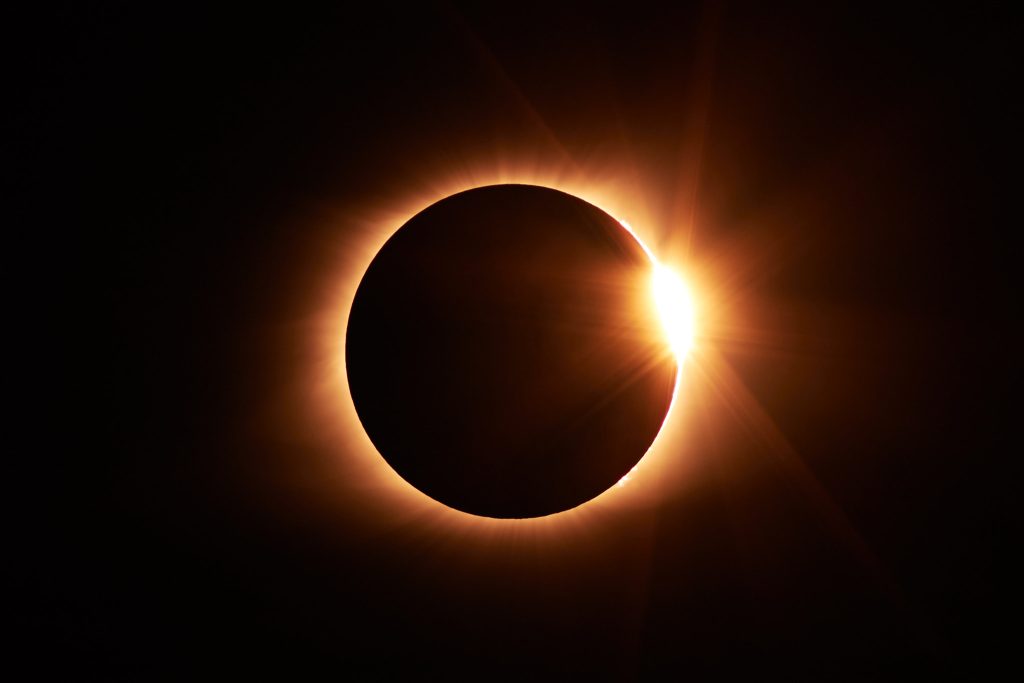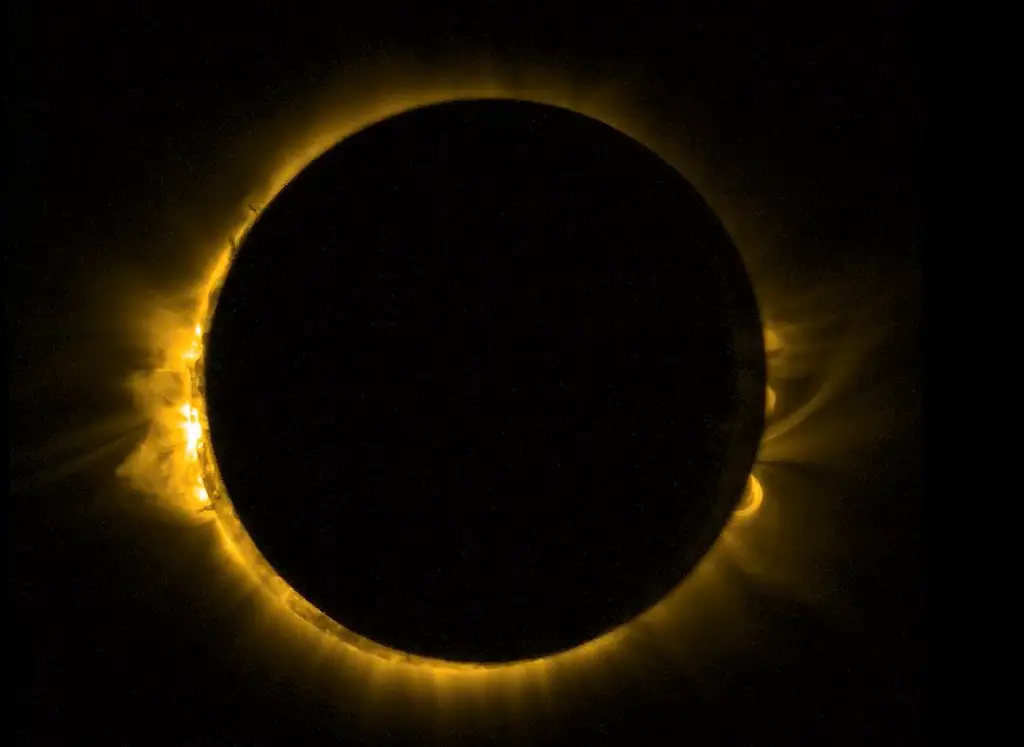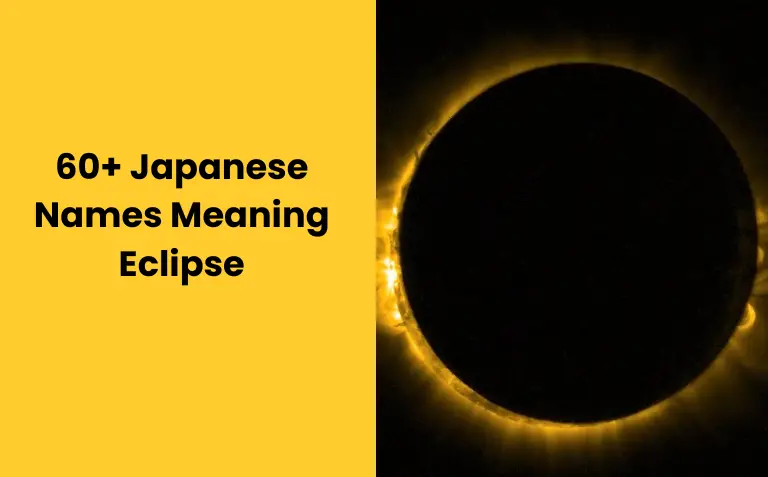In Japan, names often reflect nature’s wonders, and some are inspired by the eclipse, a breathtaking event when the sun or moon disappears momentarily. These names carry the magic of the eclipse, making them intriguing choices for babies. Let’s discover some Japanese names meaning eclipse and the stories behind them.
20+ Unisex Japanese Names Meaning Eclipse
Aki (アキ): Meaning “bright” or “clear,” like the sky after an eclipse.
Yoru (ヨル) Means “night,” like the darkness during an eclipse.
Hoshi (ホシ): Signifying “star,” like those that shine through during a solar eclipse.
Kage (カゲ): Translates to “shadow,” the dark part of an eclipse.
Kuro (クロ): Means “black” or “dark,” representing the shadow of an eclipse.
Taiyo (タイヨウ): Signifies “sun,” like the one hidden during a solar eclipse.
Yami (ヤミ): Means “darkness,” like the covering of the sun during an eclipse.
Mizuho (ミズホ): Meaning “harvest of rice,” representing the changing seasons often marked by eclipses.
Rin (リン): This word means “dignified” or “severe,” reflecting the solemnity of an eclipse.
Hikari (ヒカリ) Means “light,” symbolizing the return of brightness after an eclipse.

Sora (ソラ): Means “sky,” the canvas on which eclipses occur.
Haru (ハル): Signifying “sunlight,” like the one briefly hidden during an eclipse.
Yuki (ユキ): Means “snow,” reflecting the purity often associated with eclipses.
Kai (カイ): Translates to “ocean,” representing the vastness of space where eclipses happen.
Nao (ナオ) Means “honest” or “straight,” symbolizing the straightforwardness of an eclipse’s path.
Mizu (ミズ): Signifying “water,” reflecting the fluidity of celestial movements during eclipses.
Hoshi (ホシ) Means “star,” like those that shine through during a solar eclipse.
Ryo (リョ): This word translates to “cool” or “refreshing,” capturing the relief felt after an eclipse passes.
Hina (ヒナ): Signifying “sunlight,” reminiscent of the brightness that returns after an eclipse.
Tsubasa (ツバサ) Means “wings,” symbolizing the freedom and expansiveness of the sky during an eclipse.
Check Also: Japanese Names That Mean Shadow
20+ Male Japanese Names That Mean Eclipse
Yami (闇): Meaning “darkness,” reminiscent of the shadow cast during an eclipse.
Kage (影): Translating to “shadow,” symbolizing the darkening effect of an eclipse.
Tensho (天翔): Combining “heaven” and “soar,” suggesting the celestial dance during an eclipse.
Yoru (夜): Simply meaning “night,” capturing the darkness of an eclipse.
Akira (明): “bright” or “clear” represents the eventual return of light after an eclipse.
Ryu (流): This word means “flow” or “current,” suggesting the continuous cycle of light and darkness observed during an eclipse.
Haru (陽): Representing “sunlight,” reminiscent of the hidden sun during a solar eclipse.
Yukio (幸夫): Meaning “happiness” and “man,” embodying the joyous spectacle of an eclipse.
Hikaru (光): This word translates to “radiance” or “shine,” reflecting the brilliance of celestial bodies during an eclipse.
Asuka (飛鳥): Combining “flight” and “bird,” symbolizing the soaring spirit often associated with eclipses.
Kuro (黒): Signifying “black” or “dark,” representing the shadow of an eclipse.
Toshiro (俊郎): Meaning “intelligent” and “son,” embodying the wisdom gained from observing eclipses across generations.
Daiki (大輝): Translating to “big” and “radiance,” symbolizing the grandeur of an eclipse.
Michihiro (道博): Combining “path” and “wisdom,” reflecting the profound insights gained from witnessing eclipses.
Yukito (幸人): Signifying “happiness” and “person,” representing the joyous occasion of experiencing an eclipse.
Kaito (海斗): Meaning “ocean” and “big dipper,” symbolizing the vastness of space and the celestial bodies involved in an eclipse.
Raiden (雷電): Translating to “thunder” and “lightning,” evoking the awe-inspiring nature of eclipses.
Tsukasa (司): This word means “controller” or “master,” reflecting the powerful forces at play during an eclipse.
Kazuki (一輝): Meaning “one” and “shine,” symbolizing the singular brilliance of an eclipse.
Hiroki (大樹): Combining “big” and “tree,” representing the strength and endurance needed to witness the whole spectacle of an eclipse.
Check Also: Japanese Names That Mean Ice
20+ Female Japanese Names Meaning Eclipse
Amaterasu (天照): Meaning “shining over heaven,” inspired by the Japanese sun goddess, Amaterasu.
Hikari (光): Translating to “light,” symbolizing the brief disappearance of light during an eclipse.
Yoru (夜): Simply meaning “night,” capturing the darkness of an eclipse.
Yami (闇): Representing “darkness,” reminiscent of the shadow cast during an eclipse.
Kokoro (心): This word signifies “heart” or “spirit,” representing the emotional impact of witnessing an eclipse.
Tsukiko (月子): Meaning “moon child,” reflecting the connection between eclipses and lunar cycles.
Yukiko (雪子): Translated to “snow child,” it symbolizes the purity and innocence associated with eclipses.
Kuro (黒): Representing “black” or “dark,” reminiscent of the shadow cast during an eclipse.

Yukari (ゆかり): Meaning “connection” or “relationship,” reflecting the bond between celestial bodies during an eclipse.
Hoshi (星): Translating to “star,” symbolizing the celestial bodies involved in an eclipse.
Kage (影): Simply meaning “shadow,” evoking the darkness of an eclipse.
Haruka (遥): Signifying “distant” or “far,” representing the cosmic reach of eclipses.
Michiko (美智子): Combining “beauty,” “wisdom,” and “child,” reflecting the profound lessons learned during an eclipse.
Akemi (明美): Meaning “bright” and “beautiful,” symbolizing the eventual return of light after an eclipse.
Aya (彩): This word means “color” or “design,” and it reflects the vibrant hues often observed during eclipses.
Sakura (桜): Representing the “cherry blossom,” symbolizing the fleeting beauty of eclipses.
Tsumi (罪): Meaning “sin” or “guilt,” reflecting the awe-inspiring and sometimes ominous nature of eclipses.
Kasumi (霞): Translating to “mist” or “haze,” symbolizing the ethereal quality of eclipses.
Miyako (都): “capital” or “metropolis,” it represents the grandeur of celestial events like eclipses.
Kaiyo (海洋): Meaning “ocean” and “ocean,” reflecting the vastness and depth of the cosmic forces at play during eclipses.
Ren (蓮) Represents “lotus,” a flower often associated with enlightenment. It mirrors the clarity of vision brought by witnessing an eclipse.
Naru (なる): This word means “become” or “achieve,” suggesting the transformative power of witnessing an eclipse.
Ayumi (歩): Translating to “walk” or “path,” symbolizing the journey through darkness towards light.
Hina (陽菜): Meaning “sunlight” and “vegetables,” symbolizing the brightness and growth associated with the return of light after an eclipse.
Check Also: Japanese Names For Twins
Conclusion
In the world of Japanese names, those inspired by eclipses reflect the magic of these celestial events. From names like “Hikari,” meaning light, to “Yami,” meaning darkness, each captures a different aspect of an eclipse’s beauty. These names remind us of the wonder of the universe and our connection to it. They’re like little windows into the sky’s mysteries, reminding us that even in our names, we carry a piece of the cosmos.
